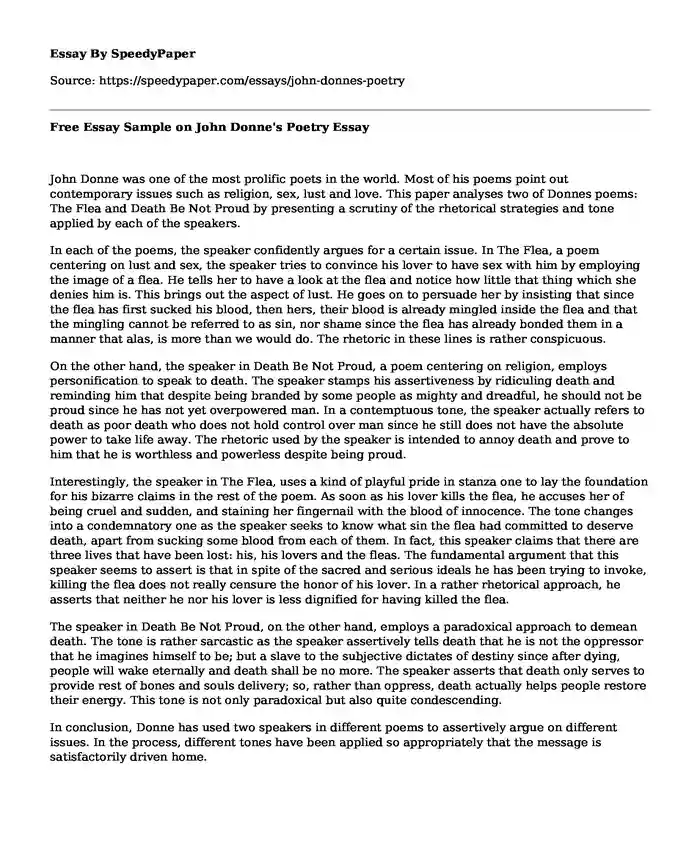
| Type of paper: | Essay |
| Categories: | English literature Poem |
| Pages: | 3 |
| Wordcount: | 600 words |
John Donne was one of the most prolific poets in the world. Most of his poems point out contemporary issues such as religion, sex, lust and love. This paper analyses two of Donnes poems: The Flea and Death Be Not Proud by presenting a scrutiny of the rhetorical strategies and tone applied by each of the speakers.
In each of the poems, the speaker confidently argues for a certain issue. In The Flea, a poem centering on lust and sex, the speaker tries to convince his lover to have sex with him by employing the image of a flea. He tells her to have a look at the flea and notice how little that thing which she denies him is. This brings out the aspect of lust. He goes on to persuade her by insisting that since the flea has first sucked his blood, then hers, their blood is already mingled inside the flea and that the mingling cannot be referred to as sin, nor shame since the flea has already bonded them in a manner that alas, is more than we would do. The rhetoric in these lines is rather conspicuous.
On the other hand, the speaker in Death Be Not Proud, a poem centering on religion, employs personification to speak to death. The speaker stamps his assertiveness by ridiculing death and reminding him that despite being branded by some people as mighty and dreadful, he should not be proud since he has not yet overpowered man. In a contemptuous tone, the speaker actually refers to death as poor death who does not hold control over man since he still does not have the absolute power to take life away. The rhetoric used by the speaker is intended to annoy death and prove to him that he is worthless and powerless despite being proud.
Interestingly, the speaker in The Flea, uses a kind of playful pride in stanza one to lay the foundation for his bizarre claims in the rest of the poem. As soon as his lover kills the flea, he accuses her of being cruel and sudden, and staining her fingernail with the blood of innocence. The tone changes into a condemnatory one as the speaker seeks to know what sin the flea had committed to deserve death, apart from sucking some blood from each of them. In fact, this speaker claims that there are three lives that have been lost: his, his lovers and the fleas. The fundamental argument that this speaker seems to assert is that in spite of the sacred and serious ideals he has been trying to invoke, killing the flea does not really censure the honor of his lover. In a rather rhetorical approach, he asserts that neither he nor his lover is less dignified for having killed the flea.
The speaker in Death Be Not Proud, on the other hand, employs a paradoxical approach to demean death. The tone is rather sarcastic as the speaker assertively tells death that he is not the oppressor that he imagines himself to be; but a slave to the subjective dictates of destiny since after dying, people will wake eternally and death shall be no more. The speaker asserts that death only serves to provide rest of bones and souls delivery; so, rather than oppress, death actually helps people restore their energy. This tone is not only paradoxical but also quite condescending.
In conclusion, Donne has used two speakers in different poems to assertively argue on different issues. In the process, different tones have been applied so appropriately that the message is satisfactorily driven home.
Cite this page
Free Essay Sample on John Donne's Poetry. (2019, Oct 31). Retrieved from https://speedypaper.com/essays/john-donnes-poetry
Request Removal
If you are the original author of this essay and no longer wish to have it published on the SpeedyPaper website, please click below to request its removal:
- Brand Equity Essay Sample
- Happy Moments Essay Sample
- Essay Sample on Residents' Attitudes Toward Tourism and Seasonality
- Philadelphia Artifact, Free Essay from Our Huge Database
- Free Paper Sample on Turbomachinery
- Free Essay Example. Sand Cone Method
- Angela's Story: A Case Study on the Reproductive System. Essay Example
Popular categories




